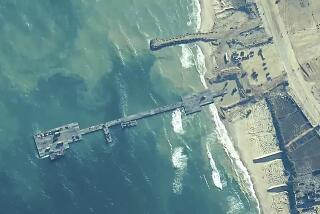Aid Convoy Heads for Iraqi Kurds : Relief: First trucks leave Turkish city, but it remains to be seen whether Baghdad will let them pass.
- Share via
ISTANBUL, Turkey — Truckloads of Western food and fuel left a Turkish marshaling point on the way to northern Iraq on Sunday, the first consignment in an $85-million program to keep the Iraqi Kurds from starving and freezing this winter.
Diplomats in the southeastern city of Diyarbakir said that about 20 trucks drove off under U.N. flags after days of rains that have rendered impassable many mountain roads controlled by guerrillas in northern Iraq’s self-declared, but desperately needy, “federal Kurdish state.”
The first convoy will be forced to take a southerly route today through Iraqi government blockade lines, which are the main cause of suffering among the 3.5 million people of Iraqi Kurdistan.
“We’ll find out (if the Iraqi checkpoints allow the aid to pass) after it goes. Baghdad has details of everything,” said Edmund Cain, the U.N. official organizing the convoy.
Diplomats hope there will be no trouble. Luckily, the area around Mosul, which the trucks will pass through, is patrolled daily by U.S. and allied warplanes of the Turkish-based deterrent force called Provide Comfort II.
Baghdad has already achieved much of its purpose in frustrating Western efforts to help the Kurds. Aid efforts have been crippled for the last four months after Baghdad refused to renew a U.N. memorandum covering relief work when it lapsed at the end of June.
A new U.N. memorandum was signed Oct. 22 in New York to cover operations until March, 1993. It foresees a “joint plan of action” that includes about $85 million of international donors’ aid for the Kurds this winter--mostly flour, dry vegetables and fuel.
Cain said pledges or money had been received for about half of the 33,000 tons of food. The United States is the lead donor, having promised up to $43 million. The U.N. plan of action aims to help 750,000 people, even though a joint mission of diplomats from the U.S. Agency for International Development and the European Community found double that number in need of help last month.
The memorandum itself is widely reviled by non-government aid agencies. They object to the fact that it caved in to all of Baghdad’s demands, that it envisaged no long-term aid and that it depended on Iraq’s much-abused control over visa procedures.
Cooperation is hard with Baghdad, they say, when terrorist attacks blamed on Baghdad are intimidating foreign aid workers in northern Iraq.
In the last month, a grenade has been tossed into the premises used by one agency. An international staffer has been shot and wounded in the chest. A U.N. representative died in a mysterious traffic accident, believed by diplomats to have been a murder.
As a result, some aid agencies have left. Others want to work parallel to the spirit of the U.N. effort rather than under its direct control. Donors are reluctant to route funds through Baghdad. Nobody is sure how much of the $85 million will be routed through Iraq and how much through Turkey.
For all its deficiencies, the U.N. memorandum is seen by diplomats as a vital umbrella for international efforts to help the Kurds and other Iraqis and especially to secure the cooperation of Turkey.
Diplomats say the aid is most needed in urban areas of Iraqi Kurdistan, because villagers managed to harvest some crops this year. But nowhere can most ordinary people afford the extortionate prices of cooking gas or heating fuel. Searching for wood, Kurds have shaved the mountainsides of trees, often in minefields. Some even dig up the roots. In towns, families sell off the most ordinary of household goods in pathetic roadside auctions.
“This is not Somalia. If they get this aid, they will scrape by this winter. The plan of action will limit the misery,” one diplomat said. “But we should be giving development aid. The issue really is, do we have to keep coughing up $100 million a year to feed people who could really be feeding themselves?”
More to Read
Sign up for Essential California
The most important California stories and recommendations in your inbox every morning.
You may occasionally receive promotional content from the Los Angeles Times.













